David Klein's Blog, page 63
July 7, 2020
My List of Must-See Movies
I have already created a list of the Most Important Novels in My Life (which is up for occasional editing and review). Now comes my list of must-see movies.
As with the most important novels, for a film to make the list it must meet one or more of the following criteria:
It was so profound and meaningful to me that I’ve seen the movie multiple times.It significantly influenced me as a writer, in terms of storytelling, structure, or character.Seeing the movie is inexorably linked to and illuminates a moment or period of time in my life.
Here’s the initial list, in no particular order. I’m sure I’ve missed some, and may regret including others. As I re-watch some of these, I will add comments, and also remove from or add movies to this list:
The GodfatherBody HeatThe Wizard of OzMichael ClaytonThe GraduateTake ShelterPulp FictionChoose MeCasablancaNocturnal AnimalsOrdinary PeopleThe Big ChillThe FugitiveJawsThe Shawshank RedemptionTrafficCrash (sorry)LantanaMartha, Marcy, May, MarleneMystic RiverAmerican BeautyGoodbye, ColumbusA History of ViolenceThe Manchurian CandidateSaving Private Ryan
The post My List of Must-See Movies appeared first on by David Klein.
July 5, 2020
July 4th: Happy Birthday You Hot Mess
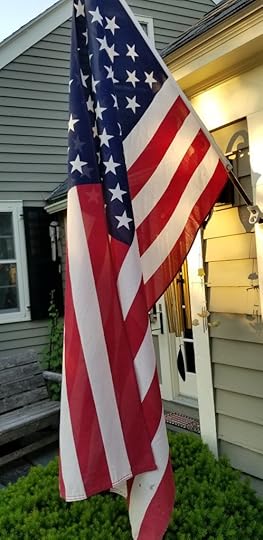
Fourth of July 2020. I looked up and down the street. Many houses were flying their flags. I was conflicted. I put mine out. I managed to fly it for an hour or so until I became uncomfortable and took it down. Here I am getting triggered by my country’s flag.
I’ve allowed to happen what I’ve railed against: the flag being a symbol of Republicans and the shithead in the white house, when in fact it belongs to all Americans.
But these days, I feel more like flying the flag upside down, which is a sign of peril and the need for rescue. Things have to get better, right? We have to become more compassionate, more inclusive, more fair. Don’t we?
The post July 4th: Happy Birthday You Hot Mess appeared first on by David Klein.
July 2, 2020
THE HOURS, Michael Cunningham
In my first graduate fiction writing workshop, I submitted a story called “Landscaping.” It was about a woman who lives largely inside her head and her stream-of-conscious voice narrates the day that a landscaper comes to her house to plant a garden.
The professor asked the class, “Who’s writing does this remind you of?” Immediately someone responded, Virginia Woolf.

I said, “Who’s she?”
I was young still. I hadn’t discovered Woolf yet. Forgive me.
But even after I did read Woolf—I vaguely remember “To the Lighthouse,” “Mrs. Dalloway,” and “A Room of One’s Own”—I never fully embraced her. I found her style to be dense and inscrutable. She was, perhaps, too literary for me.
Years later, along came Michael Cunningham’s “The Hours,” which I first read when it came out in 1997 (later saw the quality film adaptation). “The Hours” made my list of the The Most Important Novels in My Life, from which I’ve been re-reading during the time of COVID-19.
Not only does The Hours still belong in my top 25, it likely belongs in the top ten. As with the other novels that have remained dear to me, it’s the writing—the mesmerizing voice, the impeccable language, the virtuoso style—that delivers.
This risky novel of three parallel stories linked thematically by the Woolf’s “Mrs. Dalloway” could have been a pretentious dud. But the line between pretension and brilliance is thin, and Cunningham lands clearly in the land of brilliance with the hours.
The novel opens with a devastating prologue detailing Virginia Woolf’s suicidal step into a river, then alternates its three storylines: a single day with Virginia at home in the company of her husband with her sister Vanessa visiting; New Yorker Clarissa planning a party for her dying friend Richard, a minor poet and novelist who years ago during a brief love affair dubbed Clarissa Mrs. Dalloway; and the most harrowing (for me) of the three: Laura Brown, a housewife in LA in 1949, who reads “Mrs. Dalloway” while suffering from alienation and self-doubt about her life and her husband and son.
The way the storylines progress and tie together is mesmerizing. The writing never less than exceptional.
Here’s a passage about Richard:
He is not one of those egoists who miniaturize others. He is the opposite kind of egoist, driven by grandiosity rather than need, and if he insists on a version of you that is funnier, stranger, more eccentric and profound than you suspect yourself to be—capable of doing more harm and more good in the world than you’ve ever imagined—it all but impossible not to believe, at least in his presence and for a while after you’ve left him, that he alone sees through to your essence . . .
Laura Brown, after she tells her five-year-old son she loves him:
. . . although she’s said the words thousands of times, she can hear the flanneled nervousness lodged now in her throat, the effort she must make to sound natural . . . He will watch her forever. He will always know when something is wrong. He will always know precisely when and how much she has failed.
Richard, when he can’t take it anymore:
“But there are still the hours, aren’t there? One and then another, and you get through that one and then, my god, there’s another . . .”
For Richard, the unbearable hours. For Clarissa:
There’s just this for consolation: an hour here or there when our lives seem, against all odds and expectations, to burst open and give us everything we’ve ever imagined, though everyone but children (and perhaps even they) knows these hours will inevitably be followed by others, far darker and more difficult. Still, we cherish the city, the morning; we hope, more than anything, for more.
5/5 Stars
The post THE HOURS, Michael Cunningham appeared first on by David Klein.
July 1, 2020
The Most Important Novels in My Life
I have set myself a task for 2020: reread the ten most important books in my life. To qualify for the list, the novel (or novella or short story collections; I’m including those also), must meet one or more of the following criteria:
It was so profound and meaningful to me that I’ve read the novel multiple times.It significantly influenced my own development as a novelist.The experience of reading the novel is inexorably linked to and illuminates a moment or period of time in my life.
It’s going to be challenging to pick the ten books. I’m not concerned that I’ve forgotten any important book, because if I have, then that book by definition wouldn’t qualify for the list. I’ve started with 25 titles, from which I must cull down to ten.
Why am I doing this? I’m interested in how the passage of time and accumulation of life experiences have changed how I feel about a book that I once placed on a high pedestal. Has the book stood the test of time? Have I? What’s changed?
For now, I’m listing my initial list of 25, in no particular order, and without explanation. When I get down to ten, I will provide context as to why I chose each one to read again.
UPDATE: I’ve re-read some on this list of 25 and updated their status below
THE WORLD ACCORDING TO GARP, John Irving. Prob won’t crack top ten. I think I liked THE CIDER HOUSE RULES and A PRAYER FOR OWEN MEANY better.AMERICAN PASTORAL, Philip RothSELF-HELP, Lorrie MooreA FARWELL TO ARMS, Ernest HemingwayA VISIT FROM THE GOON SQUAD, Jennifer EganTHE SLAP, Christos TsiolkasTHE EXORCIST, William Peter BlattyDUNE, Frank HerbertCAT’S EYE, Margaret AtwoodTHE UNBEARABLE LIGHTNESS OF BEING, Milan KunderaTHE ROAD, Cormac McCarthyIN THE GARDEN OF NORTH AMERICAN MARTYRS, Tobia WolffLITTLE CHILDREN, Tom PerrottaSMILES ON WASHINGTON SQUARE, Raymond Federman10:30 ON A SUMMER NIGHT, Marguerite Duras. Off the list, didn’t stand the test of time. Pretentious, obtuse, overwritten. THE CATCHER IN THE RYE, J.D. SalingerA PALE VIEW OF THE HILLS, Kazuo IshiguroLOVE IN THE TIME OF CHOLERA, Gabriel Garcia Marquez. Likely top ten. It’s the writing, stupid. Many have imitated, but there’s only one GGM. BELLEFLEUR, Joyce Carol OatesTHE HOURS, Michael Cunningham. Top ten. A pattern here: it’s the writing. And the structure.LEGENDS OF THE FALL, Jim HarrisonTHE THINGS THEY CARRIED, Tim O’BrienMARIETTE IN ECSTASY, Ron Hansen. Likely top ten. The writing and language is incredible. The setting of the convent like another world.THE ACCOMPLICES, Georges Simenon. Certainly not a great novel, but it is a short, fascinating character study that made a strong impression on me.WHAT WE TALK ABOUT WHEN WE TALK ABOUT LOVE, Raymond Carver
The post The Most Important Novels in My Life appeared first on by David Klein.
I Feel Bad About Restaurants
To go out to dinner as a child was a rare and special occasion for my family, even when we went to the ubiquitous Your Host, a chain of 31 mediocre family restaurants in the Buffalo area. Fish fries and toast points. Yum! As we got older, into our teen years, my parents would take us out to dinner to a nice restaurant once a year, so we could get a little culture and practice our manners.
 These budget family restaurants were all over Buffalo
These budget family restaurants were all over BuffaloI started working in restaurants during college: as a busboy, then a bartender, a waiter, eventually becoming a manager. Fifteen years I spent in the restaurant industry. It was hard work and long hours, but it fit my lifestyle of writing during the day. I liked working on a Saturday night when everyone else was out enjoying themselves. I liked my weekends being on Monday and Tuesday when anywhere I wanted to go was less crowded than on regular weekends.
I spent my seven years in California working at the Sea Cloud, an upscale restaurant with spectacular views of Monterey Bay and the Santa Cruz beaches. I learned a lot about restaurant operations, about food and dining culture, about mixing strong and refreshing cocktails.
 The Sea Cloud was located on the Santa Cruz Municipal Wharf
The Sea Cloud was located on the Santa Cruz Municipal WharfI carried this knowledge with me throughout the years and when I switched to a different career, I still loved going to restaurants and bars. I compared every restaurant outing with my own experience and skills, and sometimes, I’ve been told, I could be a harsh critic. I didn’t like something the server said, or how a dish was served, or the glass my drink came in. But I always overtipped.
When my kids were tiny, we would sometimes go to restaurants simply to get a break from the home routine of cooking and washing dishes. It was a challenge keeping the kids entertained, but we always brought a lot of books, ordered quickly, and left as soon as we were finished eating.
Whether home or traveling, Harriet and I make a point of seeking out the best restaurants. We both love food, we love the dining experience.
Now, all that has changed. I have friends who own restaurants–and I feel bad for them. This COVID-19 pandemic is destroying many restaurant businesses. Even with restrictions lifted and indoor dining being permitted again–at significantly reduced capacity, with employees and patrons in masks, with all kinds of disinfecting going on–I have no desire to go to a restaurant.
It’s not that I fear the coronavirus so much (I do somewhat), but the restaurant experience now is just too altered, too sad. I don’t want to wear a mask every time I get up from my table, I don’t want my servers and the cooks having to wear masks, I don’t want them putting themselves at risk for my pleasure (no pleasure in dining out now), I don’t want to be scrutinizing a restaurant’s compliance with guidelines . . . none of it appeals to me. How can I enjoy my cocktail, savor my meal?
It’s just not happening. And I feel bad about that. So it’s still takeout only for me–on those nights I can’t bring myself to shop, cook and wash the dishes.
The post I Feel Bad About Restaurants appeared first on by David Klein.
June 29, 2020
Latest Novel Now With Agent
I’ve submitted my latest novel, THE SUITOR, to my agent, after we’d gone back and forth on some edits.
The story centers on three characters: recent college-grad and law-school-bound Anna; the ambitious and scheming Kyle, who loves her; and Anna’s father, Art, who doesn’t like the idea of Anna and Kyle together.
I’ve got another shot with this one. The novel has a lot going for it. The story is propulsive, the characters are multidimensional, the writing is strong. My early readers were convinced. My agent thinks I’ve got something.
All that is not nearly enough. The publishing industry (the whole world) is in enormous chaos, my sales history stinks, the competition is unrelenting.
Now I need to get lucky. My agent has to land THE SUITOR on the right publisher’s desk at the exact right moment in time for this to happen. Godspeed to you, THE SUITOR.
The post Latest Novel Now With Agent appeared first on by David Klein.
June 22, 2020
The Wind Chimes Were Quiet, and Still I Savored Them
Certain words are becoming important to me. One of them is savor. I wrote about savoring the experience of shaving. Today I took time to savor the wind chimes around our house. We have many.
Right now it’s ninety-five miserable degrees outside, the air is silent, nothing stirs the chimes. But when savor calls, you listen.
 Our newest wind chime. This bronze beauty was a father’s day gift from Owen. The bells ring deep. In the background is a chime of whales that tinkle like crystal, but one is missing and the whole thing clings to a paper clip.
Our newest wind chime. This bronze beauty was a father’s day gift from Owen. The bells ring deep. In the background is a chime of whales that tinkle like crystal, but one is missing and the whole thing clings to a paper clip.  These four, carefully arranged to allow the casement window to open, front the breezeway. The bamboo one is battered, but I still love its sound. In the middle is a reliable and sturdy ringer. The pink glass one on the right is missing its sail, the thing that hangs down in the center and catches the wind. Above the pink one hides another gentle chime.
These four, carefully arranged to allow the casement window to open, front the breezeway. The bamboo one is battered, but I still love its sound. In the middle is a reliable and sturdy ringer. The pink glass one on the right is missing its sail, the thing that hangs down in the center and catches the wind. Above the pink one hides another gentle chime. This one Harriet got from her parents. It hangs from the Southeast corner and sings a bold song. You can see the shadow of its sail on the house.
This one Harriet got from her parents. It hangs from the Southeast corner and sings a bold song. You can see the shadow of its sail on the house. This copper one in the patio garden is indestructible. You don’t hear it unless the wind is strong. In the background, another silver soprano.
This copper one in the patio garden is indestructible. You don’t hear it unless the wind is strong. In the background, another silver soprano. This bamboo chime is well camouflaged in the cherry tree. Its sound is soothing and gentle.
This bamboo chime is well camouflaged in the cherry tree. Its sound is soothing and gentle. Former wind chime, all its musical components sacrificed to the storms.
Former wind chime, all its musical components sacrificed to the storms.So I like wind chimes. If you’ve ever seen the movie Body Heat, and I hope you have, I know you loved the scene when Ned comes over to Matty’s–to see her wind chimes. I can tell you that movie has stood the test of time.
Savor: it’s one of those words to live by. Another one is: Accept. I don’t know how to write about that one yet.
The post The Wind Chimes Were Quiet, and Still I Savored Them appeared first on by David Klein.
June 16, 2020
Where are All the Monarchs?
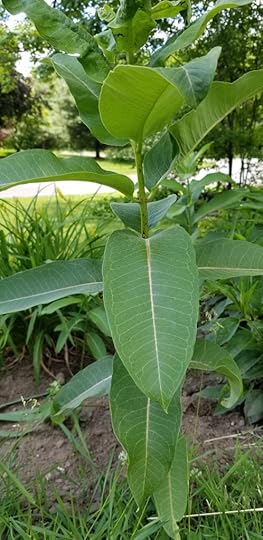
Last year at this time we were seeing butterflies all over our property. We had monarchs and swallowtails, more than we’ve had in years.
Harriet gave away forty monarch eggs she found on our milkweed plants, and she raised and released at least a half dozen monarchs of her own. She has fostered a network of butterfly-raising enthusiasts. They have a Slack channel.
This year: nothing. I haven’t seen one butterfly this season, not in my yard, not in all the acres of the Five Rivers Environmental Center, and I’m beginning to get a little concerned. Where are they? Is it just a pile-on during the age of covid-19?
Monarchs are a species in crisis, mostly due to industrial pesticide use in farming. The chemicals destroy milkweed, and monarchs will only lay their eggs on milkweed. That’s why every milkweed plant that springs up on our property is admired and counted. Some years we have more, some years less. Some years we see only a few monarchs–but we’ve never not seen any at all.
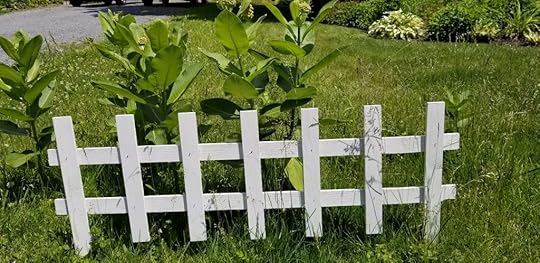
Monarchs are beautiful creatures and live fascinating lives, migrating between Mexico and the United States every year, requiring multiple generations in order to complete their journey. When you raise a monarch egg in a home habitat, you can witness the entire transformation of lifeform, from egg to caterpillar to chrysalis, to the emergence of the magnificent monarch.
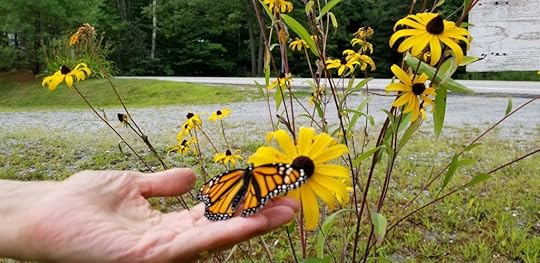
And then you get to release the monarch into nature. What’s that like? Below is an excerpt from my novel, A SERIOUS LAPSE, in which the main character, Robert, releases a monarch that his wife had raised.
Godspeed to you, butterfly. Good luck. May you live full and well the entire length of your potential 40-day lifespan.
Although the sky had opened above it, and freedom beckoned, the monarch remained perched on its twig. For thirty seconds. For a full minute. Wings opening and closing, still testing. For another minute. And then—prompted by instinct or a stimulus-response mechanism, by whatever rudimentary or complex decision-making process motivates action—Sasha’s monarch (he considered it hers; Robert simply the doorman on duty), founded as an egg, fed and raised as a caterpillar, protected in its pupa stage, housed until it kicked free from the dark, tight chrysalis, transformed from the ugly duckling into the lovely swan—Sasha’s monarch did what butterflies do: it fluttered, rose and circled, zigged and zagged. It climbed in a spiral and vectored left over the garden, strafing the bee balm and the milkweed, flying over the forget-me-nots now forgotten with their delicate blooms shrunken and dried, gliding among the fruity orange and yellow day lilies, conducting a darting and dashing patrol of the entire garden, and finally soaring above the trees on an air current.
Robert lost sight of the monarch through the gap in the tree canopy he created by felling the limb. He continued scanning the foliage and above the treetops and all around the yard. He wanted one more glimpse. Just one.
He saw movement on the other side of the pool, but it was only a small white butterfly, an ordinary specimen. He was hoping the monarch would stay close, live in their yard, breed and raise a family, but of course this could not happen. Monarchs are driven by migratory instincts. There is no such thing as the domesticated butterfly.
The post Where are All the Monarchs? appeared first on by David Klein.
June 14, 2020
THE PLAGUE, Albert Camus
No longer were there individual destinies; only a collective destiny, made of plague and the emotions shared by all.
I probably would not have chosen to read “the Plague” if we were not in the grips of the COVID-19 pandemic and had I not found the novel on a bookshelf. But it seemed an appropriate read, tucked between my rereading of the most important novels in my life.

I had just finished re-reading one of those on my list (not sure it still belongs), “The World According to Garp.” As different as they are, I found a parallel between the two novels. In Garp’s world, we’re all terminal cases. In Camus’ world, we all have the plague.
Written in 1947, the narrative unfolds in an almost thriller-like fashion, although not with the pace of contemporary thrillers. A plague descends upon the city of Oran in Algeria, and the town’s citizens arc from denial to cautious hope to fear and acceptance over the course of a year as the disease ravages the population.
The idea is that the plague can come and go, and will, at any time, without warning, just as being human means you can die, at any time, without warning, and even with warning you will die at some point. There is no escaping the plague. Now that’s existential.
A number of choices made by the characters and by the city’s administrators mirror some of our own decisions today. The town closes down, the sick are isolated, those who came in contact are quarantined, scientists race to discover a vaccine (serum), the bodies pile up, some live in fear while others flaunt restrictions.
An essential novel for our times, “The Plague” should be on everyone’s reading list.
4/5 stars.
The post THE PLAGUE, Albert Camus appeared first on by David Klein.
June 8, 2020
More on My Experience with Race and Racism
Yesterday we attended the protest rally and march in Troy. It was an incredible scene: thousands of protesters, peaceful marching, incessant chanting, almost everyone wearing a mask. I was proud to attend.
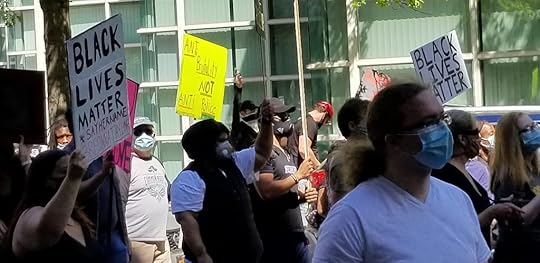
I recently wrote about my earliest memories of race and racism. Here’s what I remember after that, from my years growing up in Buffalo:
In sixth grade I joined the St. Mark Lions 90-pound football team. I was not a good player. Some of the players we picked up from the public school. These kids were black. One of them, Tony Burton, a fullback, became my friend. He lived a few blocks away. One day, he was over at my house and we were playing basketball in my driveway. Later, my father asked me why I was hanging around with that kid. I said he was my friend. My father seemed disgusted; I wasn’t sure why.One winter night my brother (three years older than me) and I were on the corner of Amherst and Parkside, a few doors down from our house. We were kids throwing snowballs at cars. One car we struck circled the block, pulled up behind us. The passenger got out, chased me down, beat and kicked me. He was a black man.I delivered papers for the Buffalo Evening News. Every Friday I would go door-to-door collecting the ninety-five cents that a week of delivery cost, hoping my customers would give me a dollar and let me keep the nickel change as a tip. Most did. At one apartment when I rang the bell, the old woman would ask in a frightened, squeaky voice: “Who is it?” “Paperboy collecting,” I answered. She would look through her peephole, then slowly open the door, keeping the chain on. She said, “I was afraid it might be Nee-groes.” No, it’s your lily-white paperboy. I’m not here to rape and murder you.In the 1960s there were race riots at Bennett High School, the public school I would have attended had I come from a poorer, less Catholic family. I remember thinking the rioting might reach my house, at least a mile away.I attended St. Joseph’s Collegiate Institute, a private, all-boys high school run by the Christian Brothers. We were an overwhelmingly white school, with a scattering of black kids, all of them on athletic scholarships. One of them, Avery Wilson, we called ‘Slavery’ Wilson. To his face. We all thought it was funny. Even Avery laughed, but I don’t know if he thought it was funny.I did have a black friend in high school, Bo Peterson, who attended public school and lived in the neighborhood. He hung around with the group I was in. Super nice guy, soft-spoken. I asked him once what he thought when people called him the N-word. He got uncomfortable. I was an idiot.Today, June 8, 2020, I have no black friends. I don’t know any black people. I live in a town that’s 92 percent white. I’m ashamed to write this. I have some acquaintances who are black who I have met through my volunteer work at RISSE, but RISSE is closed now due to the COVID-10 pandemic.In my novel STASH, there is only one character who is black: he’s a secondary character, a former NFL player turned drug-dealer and villain. At the time I was writing the novel, I hadn’t considered what hole I might be digging for myself. After the novel was published, I was doing a book talk in my town and afterward a reader (who was black) came up to me and told me how much he liked the book. So it still hadn’t registered on me what mistake I might have made. Only after some online reviews mentioned “racist undertones” in the novel did I wake up. And what did I do? I panicked. I didn’t want to be that author. I had made writing decisions that seemed to fit the story without considering what other impacts those decisions might have. That was a mistake on my part. Will I only write about middle-aged suburban white people now? Absolutely not. I want to expand, not contract, as a writer, but I’ll be more aware of the decisions I make and their potential ramifications. I read black authors; I want them to read me.
The post More on My Experience with Race and Racism appeared first on by David Klein.



